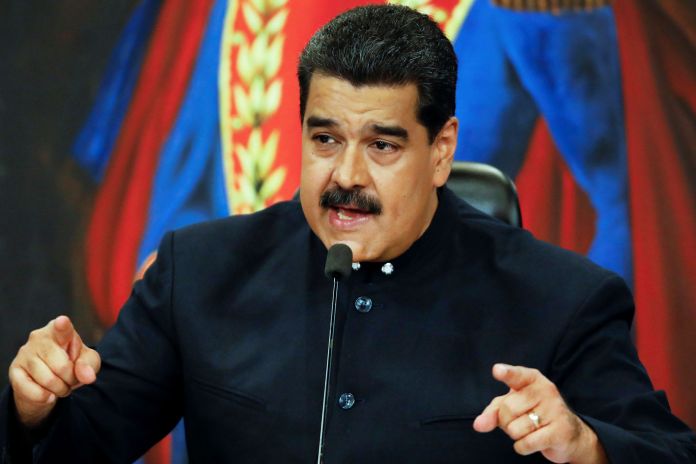By Andreína Chávez Alava
CARACAS, (venezuelanalysis.com) – President Nicolás Maduro blasted Washington’s “global dictatorship” imposed through sanctions waivers that condition how countries and companies do business with Venezuela.
“They [the US] tell a country it has permission to negotiate with Venezuela, but it cannot pay in dollars or any form of cash. It must pay with food or products. That is colonialism,” president Maduro said in a broadcast on February 2.
Maduro specifically criticized the US Treasury Department’s Office of Foreign Assets Control (OFAC) for issuing licenses that allow foreign companies to resume production and trade with Venezuelan state oil company (PDVSA) under very restrictive conditions, such as limited timeframes and no cash payments to Caracas.
“This is an unacceptable model because if you produce something, gas, crude or any other product and you sell it to a company or country you expect to be paid just as you pay for products, goods and services that are sold to you in the world,” stated Maduro.
The Venezuelan leader likewise accused the US of establishing a “global dictatorship” and stressed that the OFAC licenses are “an insult to sovereignty.” Maduro called for Latin American and Caribbean countries and governments to “denounce this colonial model.”
“We do not accept it and we will go our own way,” the president concluded.
For five years, Washington’s sanctions have blocked Venezuela’s energy industries from carrying out trade and transactions in the global energy market. Following the August 2017 financial sanctions against PDVSA, the US Treasury imposed an oil embargo in January 2019 by designating PDVSA on OFAC’s Specially Designated Nationals and Blocked Persons list. In 2020, secondary sanctions and threats against third parties, shipping intermediaries and companies further expanded the oil blockade.
Furthermore, the 2019 measure established that OFAC can issue “general licenses that authorize certain transactions and activities related to PDVSA and its subsidiaries within specified timeframes.”
In May 2022, European firms Repsol and Eni were the first to receive sanctions waivers amidst the global energy crunch following the Ukraine war, under the condition that shipments must be sent exclusively to Europe and that payments to Caracas were only used to cancel outstanding debt. In August, Caracas suspended the deal to negotiate better conditions, but no statement has been issued since then. Shipments to Europe resumed this year with PDVSA allocating a new crude cargo to Eni for February loading.
US corporation Chevron received a similar sanctions waiver in November to expand operations in Venezuela and bring oil to US refineries for six months. Caracas has stated that these licenses are a first yet small step toward lifting sanctions against the oil industry, the country’s main source of income.
However, president Maduro’s strong rebuke against the OFAC licenses came after the US Treasury issued a two-year sanctions waiver for Trinidad and Tobago to import natural gas from Venezuela’s large offshore Dragon reserves but barring “any cash payments from this project”, according to an anonymous senior US official cited by Reuters.
Trinidad’s prime minister Keith Rowley has reportedly offered food and other goods in exchange but no deal with Caracas has been made.
The Caribbean leader explained that Trinidad applied for the license in mid-2022 and won approval on January 24 following discussions with several high-level US officials, including vice-president Kamala Harris. Rowley added that his government has likewise maintained communication with president Maduro.
“This matter is one that requires state-to-state communication. The first hurdle [obtaining the OFAC waiver] has been crossed,” clarified Rowley. On Monday, Trinidad’s minister of energy and energy industries Stuart Richard Young visited Caracas and met with vice-president Delcy Rodríguez, foreign affairs minister Yván Gil, oil minister Tareck El Aissami, and PDVSA president Pedro Tellechea.
According to Rodríguez, the “work meeting” with Richard Young aimed at strengthening “relations of friendship and cooperation.” Minister Gil said they had “exchanged views on joint development in energy matters to promote the use of these resources for mutual benefit.” No official joint statement has been issued.
Venezuela is home to some of the largest natural gas reserves on the planet, with more than 200 trillion cubic feet (TCF) while the Dragon field alone contains approximately 4.2 TCF. The project is located on the maritime border between Venezuela and Trinidad and is owned by PDVSA, which discovered the gas reserves in 1985 and built the existing infrastructure. Together with the Patao, Río Caribe and Mejillones fields, Dragon forms the 14.7 TCF Mariscal Sucre deposit.
The neighbouring nations have reached several agreements in the past to jointly develop the gas-exporting field, an important source for the Caribbean. In March 2017, they signed a deal to build a pipeline and in August 2022 inked a Memorandum of Understanding for Natural Gas Supply. All projects remain hindered by US sanctions.
Trinidad has an installed capacity to process 4.2 billion cubic feet per day (BCFD) into exportable liquefied natural gas (LNG), but the country’s production is just under 3 BCFD. If current negotiations advance, the Caribbean island could gain access to 350 million cubic feet of gas per day from the Dragon field with a portion exported to Jamaica and the Dominican Republic, according to prime minister Rowley.
Additionally, a spokesperson from British multinational Shell, which produces gas in Trinidad, confirmed it could become a potential participant in the Dragon field reactivation under US authorization. Experts have estimated that boosting LNG exports could take years.





